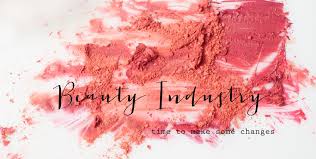Everyone seeks to be unique in their own way and have a distinct persona. It was yesteryear when people settled for generic products to resolve their beauty problems. Today’s well-aware consumers’ lookout for beauty solutions that suit their unlike needs which further leads to an emerging need for personalisation in the beauty industry. It has come to everyone’s realization that one-size does not fit all, for which customisation offers a credible solution.
For 40 years, Burger King has believed in the saying- “have it your way”. However, the lack of technological sources until now had prevented in bringing this sense of personalisation in the beauty industry.
Beauty is a very relative and personal subject. Not everyone has the same genes, skin colour, texture or lifestyle- and this is what encourages brands to think outside the box and come up with innovative solutions for the consumer’s rising needs. Today’s millennials don’t like to be told what they should do or choose. Their dictative nature believes in doing what they feel is right. Personalisation in beauty gives the consumers the authority to choose what ingredient goes in the products they use and get exactly what they want. This robust made by the beauty industry makes the consumer feel powerful and a sense of owning that cosmetic.
Customization is the latest form of luxury in the beauty industry. After all, what’s more luxurious than having a beauty product tailor-made for you! Brands create stronger relations with their customers by giving them all the authority.
From stem to stern, one is involved in curating a product they like.
The deal behind customized products
How can the brands know what is best suited for a particular customer? How do companies customize products for so many customers?
From skincare to medications, there are various brands that offer a variety of customized products. To begin with, one requires to take an online survey on the brand’s website where they answer questions concerning the brand. For example, a customized shampoo brand will require you to answer questions about your hair type, lifestyle, etc with the hair goals you wish to achieve- anti-frizz, anti-dandruff, hair growth and so on. The customer also gets to pick the active ingredients that go in.
Once the customer’s hair profile is ready, the computer looks up the clear-cut amounts of ingredients and the desired amounts of pumps that are supposed to go in the bottles. There are a series of individual computer-operated pumps that are connected to the ingredient supplies. This process is followed up with the label making process. The machine prints the name of the customer, the ingredients present in their product with ratios and a barcode on it. And the best part is that this entire process takes lesser than a minute!
An influx of information online has educated consumers on their beauty needs and made them understand their body better; they also know that everyone is unique and want their requirements to be catered for.
Our favourite examples in the world of personalized beauty
Freewill- India’s personalised haircare regimen
Freewill offers clean and natural personalised beauty solutions to the Indian market. Their product range includes shampoo, conditioner, serum and hair oils. They provide products which are sulphate-free, paraben-free and toxin-free, and are made with natural ingredients from different countries where they are sourced the best. They are also moving towards a sustainable way of production. They go by the belief- “Your hair is unique, and so is the rest of you.”
HelloAva- Personalised skincare regimen
In 2017, HelloAva was introduced in the beauty industry- a chatbot that had distinct characteristics of its own. This chatbot provides users with personalised skincare recommendations that suit their skin type. It asks 12 simple questions to the consumer to get their consumer profile and places them in one of the 30 categories before giving personalised suggestions. The products are dermatologically tested and are safe to use.
The future of personalised beauty
Beauty personalisation allows people to embrace who they are and their unique characteristics without having to resort to generic chemical loaded products. It is also a great solution for consumers who have a hard time understanding what their hair or skin needs. Teenagers who still are exploring what works for them and what doesn’t can also easily switch to personalised beauty as it is safer and a smarter choice for when your skin is the most sensitive.
Consumers simply don’t need overwhelming information about what niacinamide or different detergents that are present in the products. Giving them the dominion over the key ingredients that go in is enough. However, personalisation of products is just not enough. Having chances to boost interactions with the customers both online and offline by having- good customer service, labels that read the customers name and ingredients, and educating them about different haircare or skincare ideas not only build personable engagement but also gain their trust. What customers seek is a holistic shopping experience.
The bottom line is that customers love to be involved. The customisation process makes them grow more attached to the products they use. According to various brands, a worthwhile experience is delivered to a customer when they are satisfied with the feeling of creating something unique for themselves.
Author: Shweta Jhawar

